Management and Operations at Sainsbury's: A Leadership Perspective
VerifiedAdded on 2021/01/03
|10
|3543
|484
Report
AI Summary
This report provides a comprehensive analysis of leadership and management practices within Sainsbury's, a prominent UK supermarket chain. It begins by differentiating between the roles of leaders and managers, highlighting their respective responsibilities and characteristics. The report then explores how these roles and functions apply in different organizational contexts, emphasizing the importance of clear vision, morale building, planning, organizing, commanding, coordinating, and controlling. Furthermore, it delves into various leadership theories, such as contingency and situational leadership, and how they can be applied to address different organizational challenges. The report underscores the significance of effective leadership and management in achieving Sainsbury's business goals and maintaining its competitive edge in the retail market.
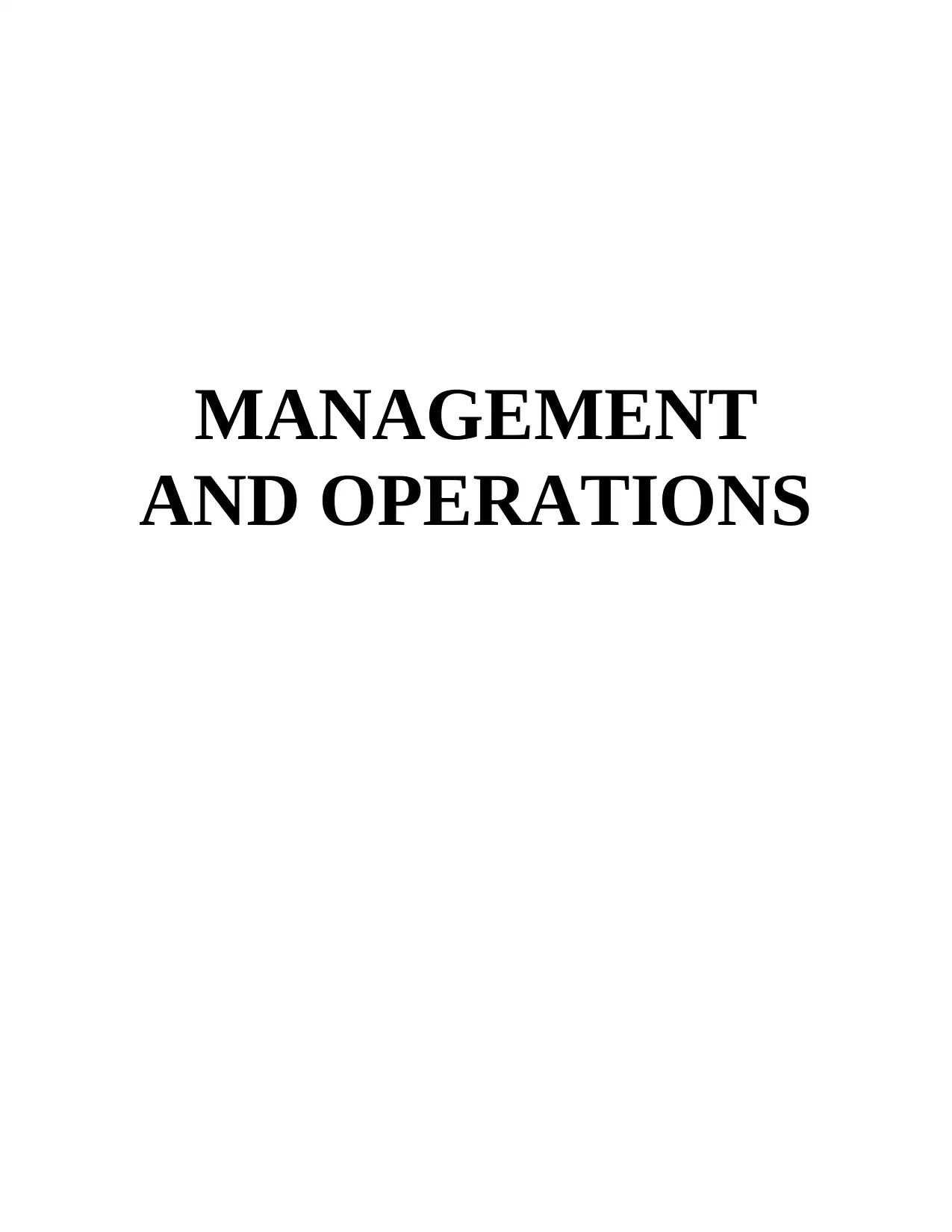
MANAGEMENT
AND OPERATIONS
AND OPERATIONS
Paraphrase This Document
Need a fresh take? Get an instant paraphrase of this document with our AI Paraphraser
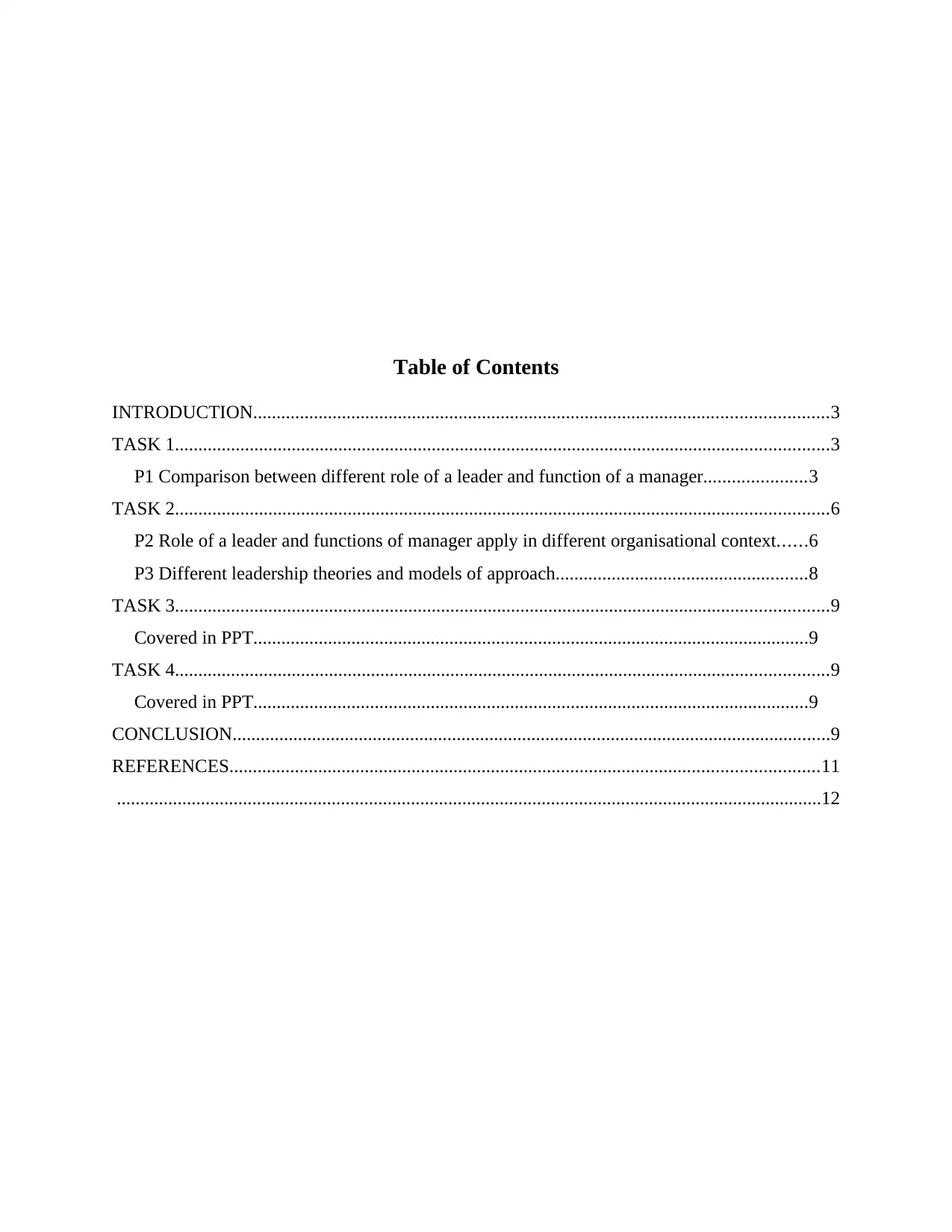
Table of Contents
INTRODUCTION...........................................................................................................................3
TASK 1............................................................................................................................................3
P1 Comparison between different role of a leader and function of a manager......................3
TASK 2............................................................................................................................................6
P2 Role of a leader and functions of manager apply in different organisational context......6
P3 Different leadership theories and models of approach......................................................8
TASK 3............................................................................................................................................9
Covered in PPT.......................................................................................................................9
TASK 4............................................................................................................................................9
Covered in PPT.......................................................................................................................9
CONCLUSION................................................................................................................................9
REFERENCES..............................................................................................................................11
.......................................................................................................................................................12
INTRODUCTION...........................................................................................................................3
TASK 1............................................................................................................................................3
P1 Comparison between different role of a leader and function of a manager......................3
TASK 2............................................................................................................................................6
P2 Role of a leader and functions of manager apply in different organisational context......6
P3 Different leadership theories and models of approach......................................................8
TASK 3............................................................................................................................................9
Covered in PPT.......................................................................................................................9
TASK 4............................................................................................................................................9
Covered in PPT.......................................................................................................................9
CONCLUSION................................................................................................................................9
REFERENCES..............................................................................................................................11
.......................................................................................................................................................12
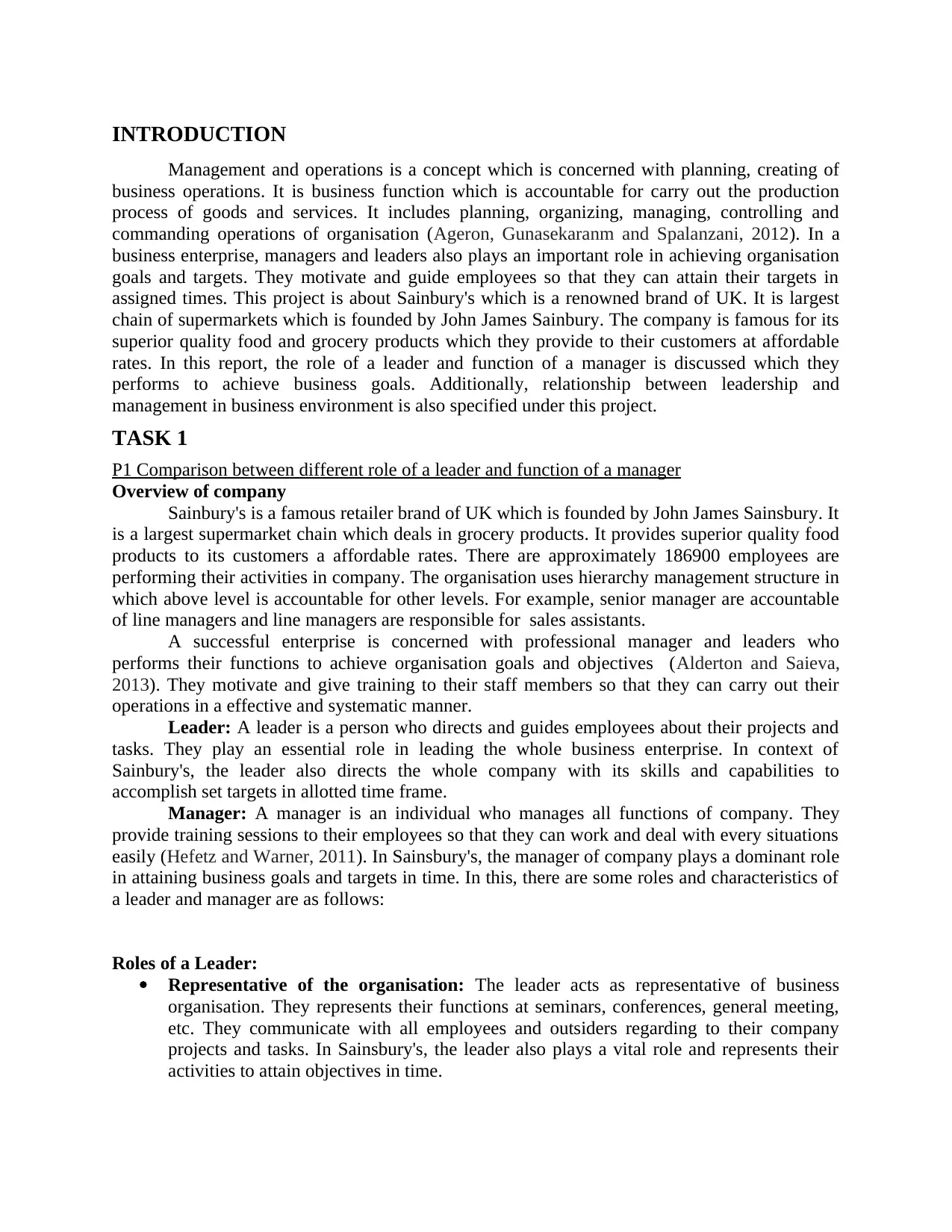
INTRODUCTION
Management and operations is a concept which is concerned with planning, creating of
business operations. It is business function which is accountable for carry out the production
process of goods and services. It includes planning, organizing, managing, controlling and
commanding operations of organisation (Ageron, Gunasekaranm and Spalanzani, 2012). In a
business enterprise, managers and leaders also plays an important role in achieving organisation
goals and targets. They motivate and guide employees so that they can attain their targets in
assigned times. This project is about Sainbury's which is a renowned brand of UK. It is largest
chain of supermarkets which is founded by John James Sainbury. The company is famous for its
superior quality food and grocery products which they provide to their customers at affordable
rates. In this report, the role of a leader and function of a manager is discussed which they
performs to achieve business goals. Additionally, relationship between leadership and
management in business environment is also specified under this project.
TASK 1
P1 Comparison between different role of a leader and function of a manager
Overview of company
Sainbury's is a famous retailer brand of UK which is founded by John James Sainsbury. It
is a largest supermarket chain which deals in grocery products. It provides superior quality food
products to its customers a affordable rates. There are approximately 186900 employees are
performing their activities in company. The organisation uses hierarchy management structure in
which above level is accountable for other levels. For example, senior manager are accountable
of line managers and line managers are responsible for sales assistants.
A successful enterprise is concerned with professional manager and leaders who
performs their functions to achieve organisation goals and objectives (Alderton and Saieva,
2013). They motivate and give training to their staff members so that they can carry out their
operations in a effective and systematic manner.
Leader: A leader is a person who directs and guides employees about their projects and
tasks. They play an essential role in leading the whole business enterprise. In context of
Sainbury's, the leader also directs the whole company with its skills and capabilities to
accomplish set targets in allotted time frame.
Manager: A manager is an individual who manages all functions of company. They
provide training sessions to their employees so that they can work and deal with every situations
easily (Hefetz and Warner, 2011). In Sainsbury's, the manager of company plays a dominant role
in attaining business goals and targets in time. In this, there are some roles and characteristics of
a leader and manager are as follows:
Roles of a Leader:
Representative of the organisation: The leader acts as representative of business
organisation. They represents their functions at seminars, conferences, general meeting,
etc. They communicate with all employees and outsiders regarding to their company
projects and tasks. In Sainsbury's, the leader also plays a vital role and represents their
activities to attain objectives in time.
Management and operations is a concept which is concerned with planning, creating of
business operations. It is business function which is accountable for carry out the production
process of goods and services. It includes planning, organizing, managing, controlling and
commanding operations of organisation (Ageron, Gunasekaranm and Spalanzani, 2012). In a
business enterprise, managers and leaders also plays an important role in achieving organisation
goals and targets. They motivate and guide employees so that they can attain their targets in
assigned times. This project is about Sainbury's which is a renowned brand of UK. It is largest
chain of supermarkets which is founded by John James Sainbury. The company is famous for its
superior quality food and grocery products which they provide to their customers at affordable
rates. In this report, the role of a leader and function of a manager is discussed which they
performs to achieve business goals. Additionally, relationship between leadership and
management in business environment is also specified under this project.
TASK 1
P1 Comparison between different role of a leader and function of a manager
Overview of company
Sainbury's is a famous retailer brand of UK which is founded by John James Sainsbury. It
is a largest supermarket chain which deals in grocery products. It provides superior quality food
products to its customers a affordable rates. There are approximately 186900 employees are
performing their activities in company. The organisation uses hierarchy management structure in
which above level is accountable for other levels. For example, senior manager are accountable
of line managers and line managers are responsible for sales assistants.
A successful enterprise is concerned with professional manager and leaders who
performs their functions to achieve organisation goals and objectives (Alderton and Saieva,
2013). They motivate and give training to their staff members so that they can carry out their
operations in a effective and systematic manner.
Leader: A leader is a person who directs and guides employees about their projects and
tasks. They play an essential role in leading the whole business enterprise. In context of
Sainbury's, the leader also directs the whole company with its skills and capabilities to
accomplish set targets in allotted time frame.
Manager: A manager is an individual who manages all functions of company. They
provide training sessions to their employees so that they can work and deal with every situations
easily (Hefetz and Warner, 2011). In Sainsbury's, the manager of company plays a dominant role
in attaining business goals and targets in time. In this, there are some roles and characteristics of
a leader and manager are as follows:
Roles of a Leader:
Representative of the organisation: The leader acts as representative of business
organisation. They represents their functions at seminars, conferences, general meeting,
etc. They communicate with all employees and outsiders regarding to their company
projects and tasks. In Sainsbury's, the leader also plays a vital role and represents their
activities to attain objectives in time.
⊘ This is a preview!⊘
Do you want full access?
Subscribe today to unlock all pages.

Trusted by 1+ million students worldwide
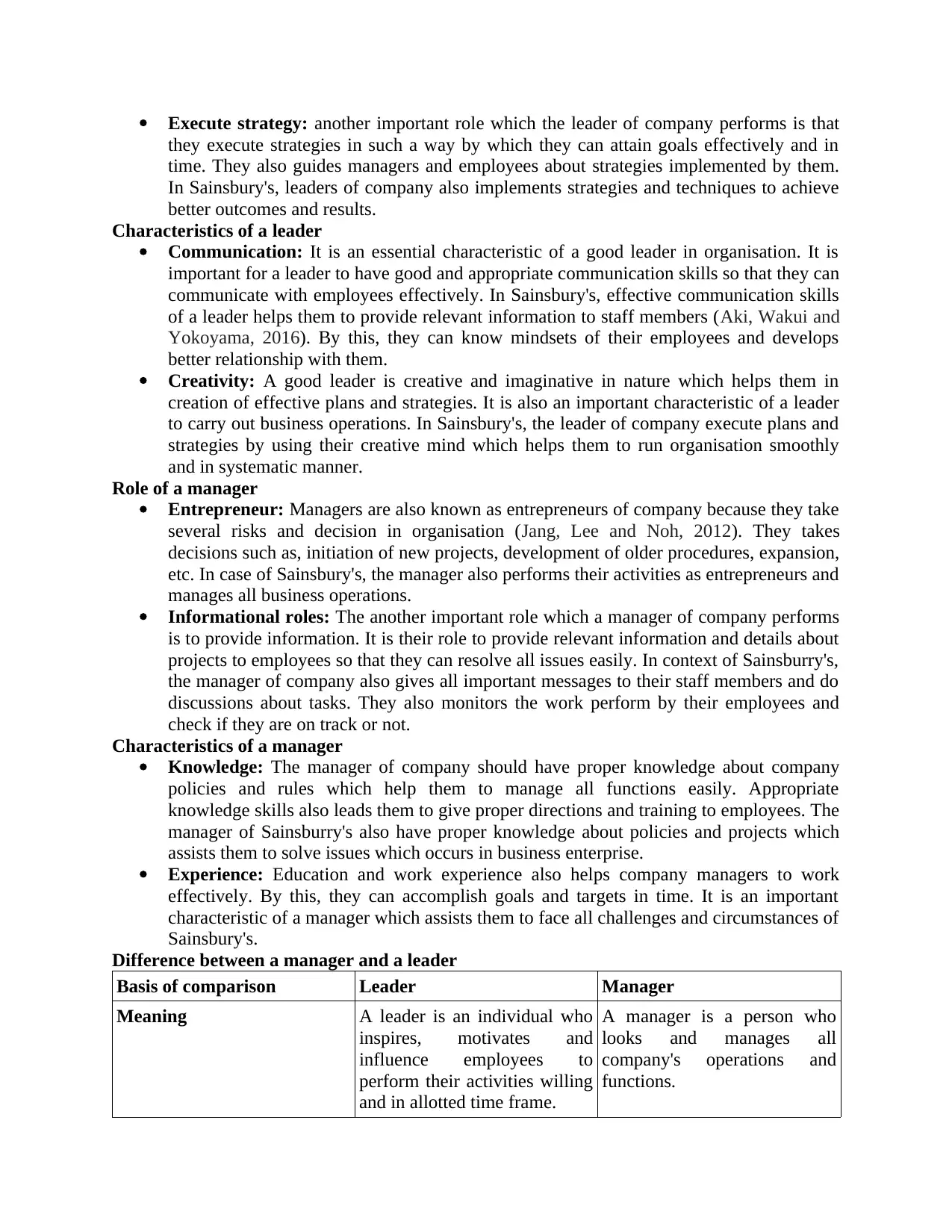
Execute strategy: another important role which the leader of company performs is that
they execute strategies in such a way by which they can attain goals effectively and in
time. They also guides managers and employees about strategies implemented by them.
In Sainsbury's, leaders of company also implements strategies and techniques to achieve
better outcomes and results.
Characteristics of a leader
Communication: It is an essential characteristic of a good leader in organisation. It is
important for a leader to have good and appropriate communication skills so that they can
communicate with employees effectively. In Sainsbury's, effective communication skills
of a leader helps them to provide relevant information to staff members (Aki, Wakui and
Yokoyama, 2016). By this, they can know mindsets of their employees and develops
better relationship with them.
Creativity: A good leader is creative and imaginative in nature which helps them in
creation of effective plans and strategies. It is also an important characteristic of a leader
to carry out business operations. In Sainsbury's, the leader of company execute plans and
strategies by using their creative mind which helps them to run organisation smoothly
and in systematic manner.
Role of a manager
Entrepreneur: Managers are also known as entrepreneurs of company because they take
several risks and decision in organisation (Jang, Lee and Noh, 2012). They takes
decisions such as, initiation of new projects, development of older procedures, expansion,
etc. In case of Sainsbury's, the manager also performs their activities as entrepreneurs and
manages all business operations.
Informational roles: The another important role which a manager of company performs
is to provide information. It is their role to provide relevant information and details about
projects to employees so that they can resolve all issues easily. In context of Sainsburry's,
the manager of company also gives all important messages to their staff members and do
discussions about tasks. They also monitors the work perform by their employees and
check if they are on track or not.
Characteristics of a manager
Knowledge: The manager of company should have proper knowledge about company
policies and rules which help them to manage all functions easily. Appropriate
knowledge skills also leads them to give proper directions and training to employees. The
manager of Sainsburry's also have proper knowledge about policies and projects which
assists them to solve issues which occurs in business enterprise.
Experience: Education and work experience also helps company managers to work
effectively. By this, they can accomplish goals and targets in time. It is an important
characteristic of a manager which assists them to face all challenges and circumstances of
Sainsbury's.
Difference between a manager and a leader
Basis of comparison Leader Manager
Meaning A leader is an individual who
inspires, motivates and
influence employees to
perform their activities willing
and in allotted time frame.
A manager is a person who
looks and manages all
company's operations and
functions.
they execute strategies in such a way by which they can attain goals effectively and in
time. They also guides managers and employees about strategies implemented by them.
In Sainsbury's, leaders of company also implements strategies and techniques to achieve
better outcomes and results.
Characteristics of a leader
Communication: It is an essential characteristic of a good leader in organisation. It is
important for a leader to have good and appropriate communication skills so that they can
communicate with employees effectively. In Sainsbury's, effective communication skills
of a leader helps them to provide relevant information to staff members (Aki, Wakui and
Yokoyama, 2016). By this, they can know mindsets of their employees and develops
better relationship with them.
Creativity: A good leader is creative and imaginative in nature which helps them in
creation of effective plans and strategies. It is also an important characteristic of a leader
to carry out business operations. In Sainsbury's, the leader of company execute plans and
strategies by using their creative mind which helps them to run organisation smoothly
and in systematic manner.
Role of a manager
Entrepreneur: Managers are also known as entrepreneurs of company because they take
several risks and decision in organisation (Jang, Lee and Noh, 2012). They takes
decisions such as, initiation of new projects, development of older procedures, expansion,
etc. In case of Sainsbury's, the manager also performs their activities as entrepreneurs and
manages all business operations.
Informational roles: The another important role which a manager of company performs
is to provide information. It is their role to provide relevant information and details about
projects to employees so that they can resolve all issues easily. In context of Sainsburry's,
the manager of company also gives all important messages to their staff members and do
discussions about tasks. They also monitors the work perform by their employees and
check if they are on track or not.
Characteristics of a manager
Knowledge: The manager of company should have proper knowledge about company
policies and rules which help them to manage all functions easily. Appropriate
knowledge skills also leads them to give proper directions and training to employees. The
manager of Sainsburry's also have proper knowledge about policies and projects which
assists them to solve issues which occurs in business enterprise.
Experience: Education and work experience also helps company managers to work
effectively. By this, they can accomplish goals and targets in time. It is an important
characteristic of a manager which assists them to face all challenges and circumstances of
Sainsbury's.
Difference between a manager and a leader
Basis of comparison Leader Manager
Meaning A leader is an individual who
inspires, motivates and
influence employees to
perform their activities willing
and in allotted time frame.
A manager is a person who
looks and manages all
company's operations and
functions.
Paraphrase This Document
Need a fresh take? Get an instant paraphrase of this document with our AI Paraphraser
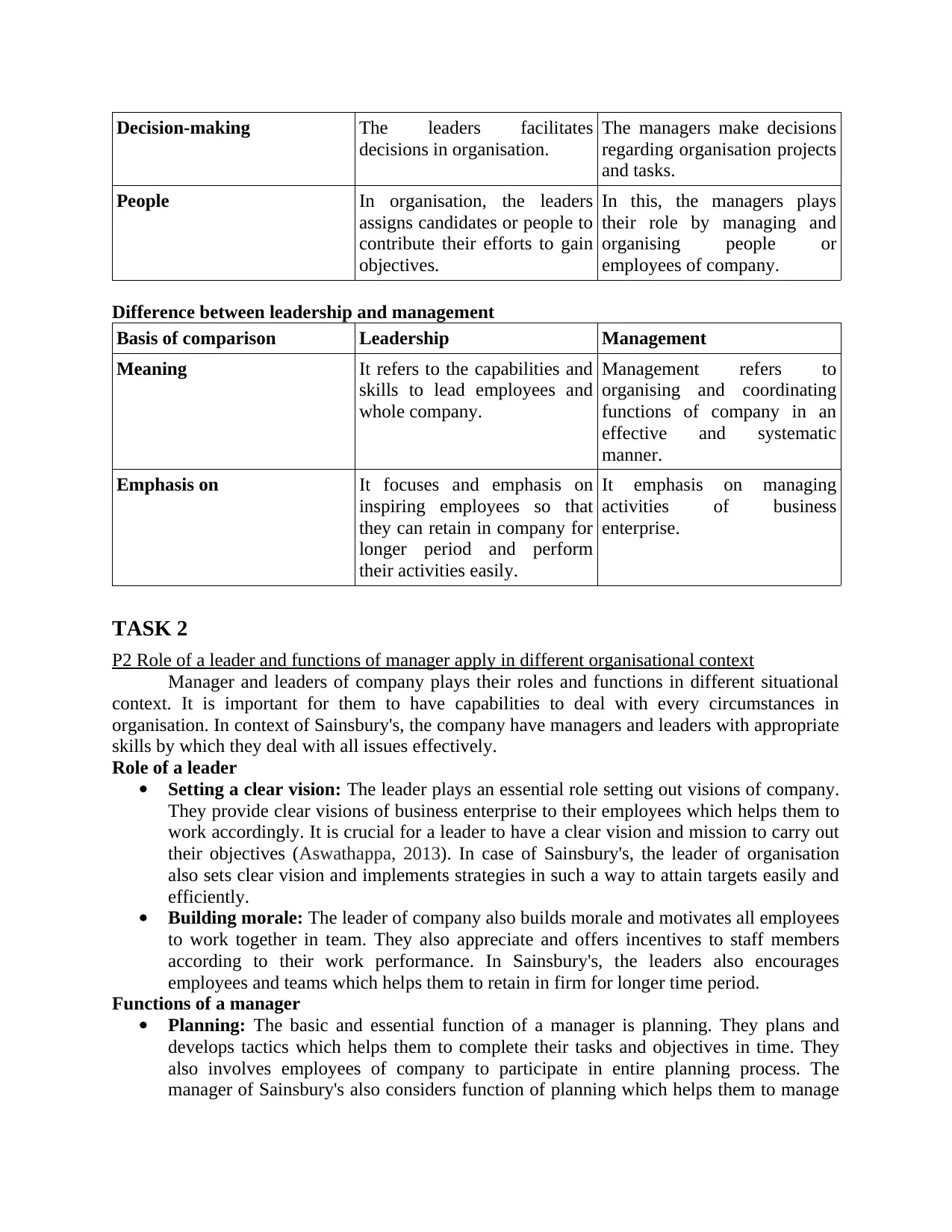
Decision-making The leaders facilitates
decisions in organisation.
The managers make decisions
regarding organisation projects
and tasks.
People In organisation, the leaders
assigns candidates or people to
contribute their efforts to gain
objectives.
In this, the managers plays
their role by managing and
organising people or
employees of company.
Difference between leadership and management
Basis of comparison Leadership Management
Meaning It refers to the capabilities and
skills to lead employees and
whole company.
Management refers to
organising and coordinating
functions of company in an
effective and systematic
manner.
Emphasis on It focuses and emphasis on
inspiring employees so that
they can retain in company for
longer period and perform
their activities easily.
It emphasis on managing
activities of business
enterprise.
TASK 2
P2 Role of a leader and functions of manager apply in different organisational context
Manager and leaders of company plays their roles and functions in different situational
context. It is important for them to have capabilities to deal with every circumstances in
organisation. In context of Sainsbury's, the company have managers and leaders with appropriate
skills by which they deal with all issues effectively.
Role of a leader
Setting a clear vision: The leader plays an essential role setting out visions of company.
They provide clear visions of business enterprise to their employees which helps them to
work accordingly. It is crucial for a leader to have a clear vision and mission to carry out
their objectives (Aswathappa, 2013). In case of Sainsbury's, the leader of organisation
also sets clear vision and implements strategies in such a way to attain targets easily and
efficiently.
Building morale: The leader of company also builds morale and motivates all employees
to work together in team. They also appreciate and offers incentives to staff members
according to their work performance. In Sainsbury's, the leaders also encourages
employees and teams which helps them to retain in firm for longer time period.
Functions of a manager
Planning: The basic and essential function of a manager is planning. They plans and
develops tactics which helps them to complete their tasks and objectives in time. They
also involves employees of company to participate in entire planning process. The
manager of Sainsbury's also considers function of planning which helps them to manage
decisions in organisation.
The managers make decisions
regarding organisation projects
and tasks.
People In organisation, the leaders
assigns candidates or people to
contribute their efforts to gain
objectives.
In this, the managers plays
their role by managing and
organising people or
employees of company.
Difference between leadership and management
Basis of comparison Leadership Management
Meaning It refers to the capabilities and
skills to lead employees and
whole company.
Management refers to
organising and coordinating
functions of company in an
effective and systematic
manner.
Emphasis on It focuses and emphasis on
inspiring employees so that
they can retain in company for
longer period and perform
their activities easily.
It emphasis on managing
activities of business
enterprise.
TASK 2
P2 Role of a leader and functions of manager apply in different organisational context
Manager and leaders of company plays their roles and functions in different situational
context. It is important for them to have capabilities to deal with every circumstances in
organisation. In context of Sainsbury's, the company have managers and leaders with appropriate
skills by which they deal with all issues effectively.
Role of a leader
Setting a clear vision: The leader plays an essential role setting out visions of company.
They provide clear visions of business enterprise to their employees which helps them to
work accordingly. It is crucial for a leader to have a clear vision and mission to carry out
their objectives (Aswathappa, 2013). In case of Sainsbury's, the leader of organisation
also sets clear vision and implements strategies in such a way to attain targets easily and
efficiently.
Building morale: The leader of company also builds morale and motivates all employees
to work together in team. They also appreciate and offers incentives to staff members
according to their work performance. In Sainsbury's, the leaders also encourages
employees and teams which helps them to retain in firm for longer time period.
Functions of a manager
Planning: The basic and essential function of a manager is planning. They plans and
develops tactics which helps them to complete their tasks and objectives in time. They
also involves employees of company to participate in entire planning process. The
manager of Sainsbury's also considers function of planning which helps them to manage
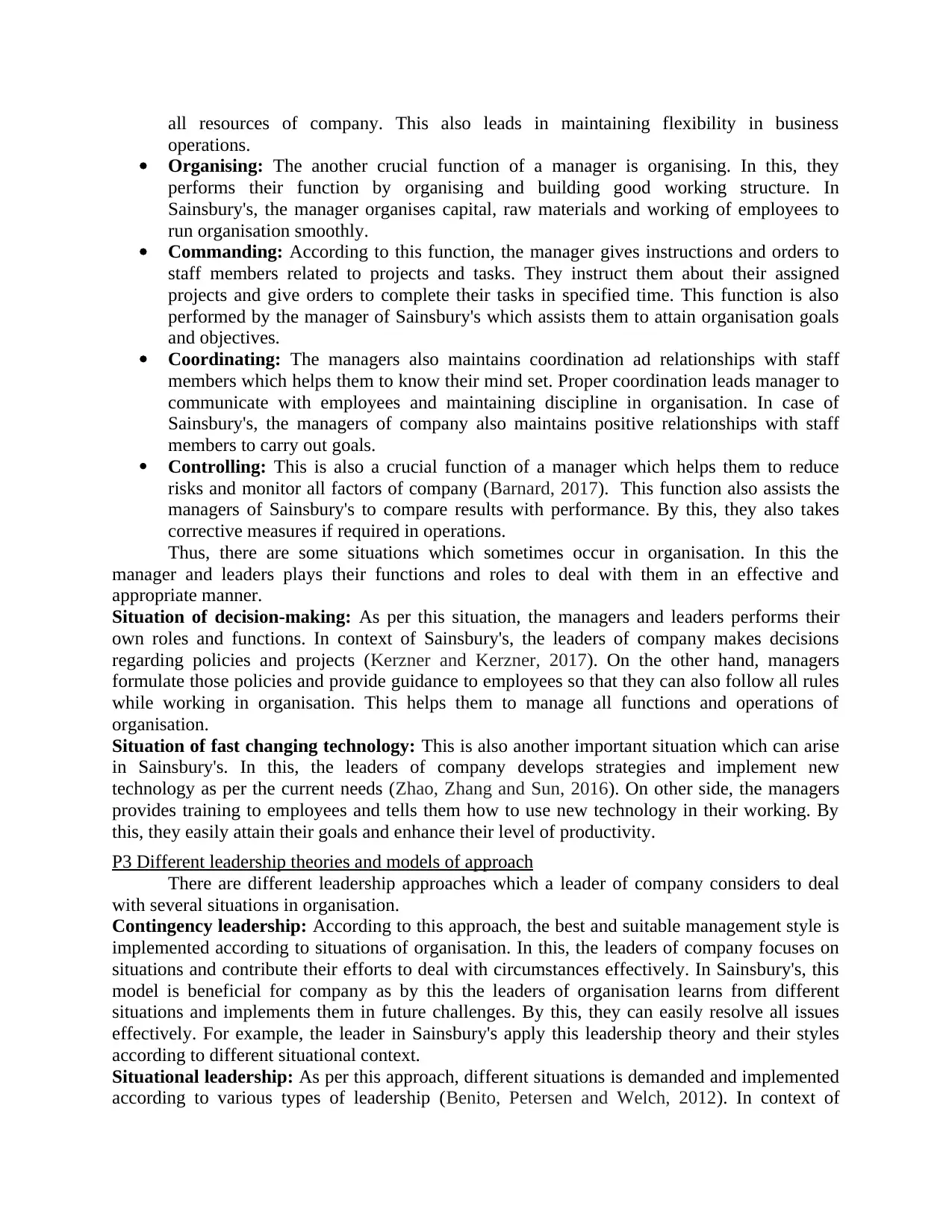
all resources of company. This also leads in maintaining flexibility in business
operations.
Organising: The another crucial function of a manager is organising. In this, they
performs their function by organising and building good working structure. In
Sainsbury's, the manager organises capital, raw materials and working of employees to
run organisation smoothly.
Commanding: According to this function, the manager gives instructions and orders to
staff members related to projects and tasks. They instruct them about their assigned
projects and give orders to complete their tasks in specified time. This function is also
performed by the manager of Sainsbury's which assists them to attain organisation goals
and objectives.
Coordinating: The managers also maintains coordination ad relationships with staff
members which helps them to know their mind set. Proper coordination leads manager to
communicate with employees and maintaining discipline in organisation. In case of
Sainsbury's, the managers of company also maintains positive relationships with staff
members to carry out goals.
Controlling: This is also a crucial function of a manager which helps them to reduce
risks and monitor all factors of company (Barnard, 2017). This function also assists the
managers of Sainsbury's to compare results with performance. By this, they also takes
corrective measures if required in operations.
Thus, there are some situations which sometimes occur in organisation. In this the
manager and leaders plays their functions and roles to deal with them in an effective and
appropriate manner.
Situation of decision-making: As per this situation, the managers and leaders performs their
own roles and functions. In context of Sainsbury's, the leaders of company makes decisions
regarding policies and projects (Kerzner and Kerzner, 2017). On the other hand, managers
formulate those policies and provide guidance to employees so that they can also follow all rules
while working in organisation. This helps them to manage all functions and operations of
organisation.
Situation of fast changing technology: This is also another important situation which can arise
in Sainsbury's. In this, the leaders of company develops strategies and implement new
technology as per the current needs (Zhao, Zhang and Sun, 2016). On other side, the managers
provides training to employees and tells them how to use new technology in their working. By
this, they easily attain their goals and enhance their level of productivity.
P3 Different leadership theories and models of approach
There are different leadership approaches which a leader of company considers to deal
with several situations in organisation.
Contingency leadership: According to this approach, the best and suitable management style is
implemented according to situations of organisation. In this, the leaders of company focuses on
situations and contribute their efforts to deal with circumstances effectively. In Sainsbury's, this
model is beneficial for company as by this the leaders of organisation learns from different
situations and implements them in future challenges. By this, they can easily resolve all issues
effectively. For example, the leader in Sainsbury's apply this leadership theory and their styles
according to different situational context.
Situational leadership: As per this approach, different situations is demanded and implemented
according to various types of leadership (Benito, Petersen and Welch, 2012). In context of
operations.
Organising: The another crucial function of a manager is organising. In this, they
performs their function by organising and building good working structure. In
Sainsbury's, the manager organises capital, raw materials and working of employees to
run organisation smoothly.
Commanding: According to this function, the manager gives instructions and orders to
staff members related to projects and tasks. They instruct them about their assigned
projects and give orders to complete their tasks in specified time. This function is also
performed by the manager of Sainsbury's which assists them to attain organisation goals
and objectives.
Coordinating: The managers also maintains coordination ad relationships with staff
members which helps them to know their mind set. Proper coordination leads manager to
communicate with employees and maintaining discipline in organisation. In case of
Sainsbury's, the managers of company also maintains positive relationships with staff
members to carry out goals.
Controlling: This is also a crucial function of a manager which helps them to reduce
risks and monitor all factors of company (Barnard, 2017). This function also assists the
managers of Sainsbury's to compare results with performance. By this, they also takes
corrective measures if required in operations.
Thus, there are some situations which sometimes occur in organisation. In this the
manager and leaders plays their functions and roles to deal with them in an effective and
appropriate manner.
Situation of decision-making: As per this situation, the managers and leaders performs their
own roles and functions. In context of Sainsbury's, the leaders of company makes decisions
regarding policies and projects (Kerzner and Kerzner, 2017). On the other hand, managers
formulate those policies and provide guidance to employees so that they can also follow all rules
while working in organisation. This helps them to manage all functions and operations of
organisation.
Situation of fast changing technology: This is also another important situation which can arise
in Sainsbury's. In this, the leaders of company develops strategies and implement new
technology as per the current needs (Zhao, Zhang and Sun, 2016). On other side, the managers
provides training to employees and tells them how to use new technology in their working. By
this, they easily attain their goals and enhance their level of productivity.
P3 Different leadership theories and models of approach
There are different leadership approaches which a leader of company considers to deal
with several situations in organisation.
Contingency leadership: According to this approach, the best and suitable management style is
implemented according to situations of organisation. In this, the leaders of company focuses on
situations and contribute their efforts to deal with circumstances effectively. In Sainsbury's, this
model is beneficial for company as by this the leaders of organisation learns from different
situations and implements them in future challenges. By this, they can easily resolve all issues
effectively. For example, the leader in Sainsbury's apply this leadership theory and their styles
according to different situational context.
Situational leadership: As per this approach, different situations is demanded and implemented
according to various types of leadership (Benito, Petersen and Welch, 2012). In context of
⊘ This is a preview!⊘
Do you want full access?
Subscribe today to unlock all pages.

Trusted by 1+ million students worldwide
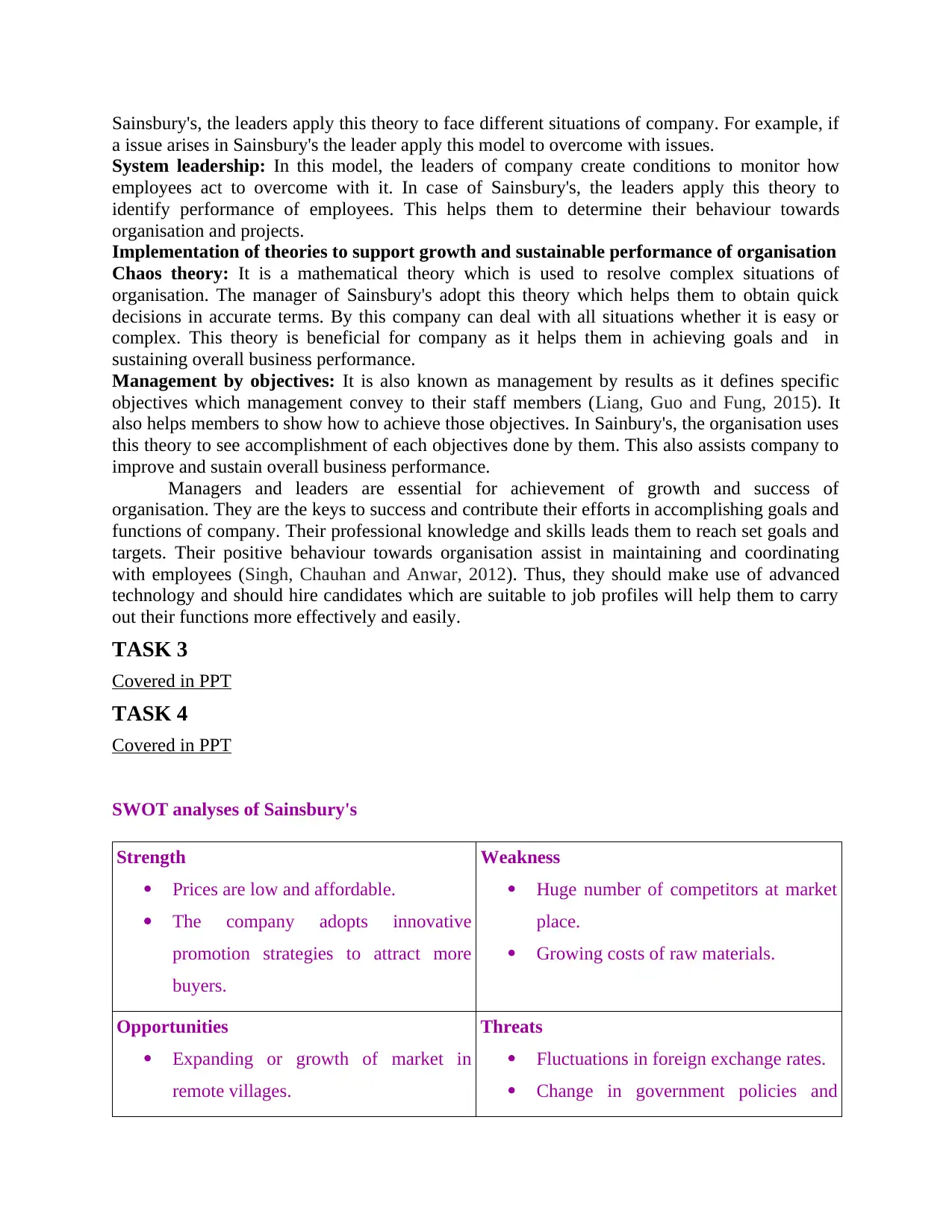
Sainsbury's, the leaders apply this theory to face different situations of company. For example, if
a issue arises in Sainsbury's the leader apply this model to overcome with issues.
System leadership: In this model, the leaders of company create conditions to monitor how
employees act to overcome with it. In case of Sainsbury's, the leaders apply this theory to
identify performance of employees. This helps them to determine their behaviour towards
organisation and projects.
Implementation of theories to support growth and sustainable performance of organisation
Chaos theory: It is a mathematical theory which is used to resolve complex situations of
organisation. The manager of Sainsbury's adopt this theory which helps them to obtain quick
decisions in accurate terms. By this company can deal with all situations whether it is easy or
complex. This theory is beneficial for company as it helps them in achieving goals and in
sustaining overall business performance.
Management by objectives: It is also known as management by results as it defines specific
objectives which management convey to their staff members (Liang, Guo and Fung, 2015). It
also helps members to show how to achieve those objectives. In Sainbury's, the organisation uses
this theory to see accomplishment of each objectives done by them. This also assists company to
improve and sustain overall business performance.
Managers and leaders are essential for achievement of growth and success of
organisation. They are the keys to success and contribute their efforts in accomplishing goals and
functions of company. Their professional knowledge and skills leads them to reach set goals and
targets. Their positive behaviour towards organisation assist in maintaining and coordinating
with employees (Singh, Chauhan and Anwar, 2012). Thus, they should make use of advanced
technology and should hire candidates which are suitable to job profiles will help them to carry
out their functions more effectively and easily.
TASK 3
Covered in PPT
TASK 4
Covered in PPT
SWOT analyses of Sainsbury's
Strength
Prices are low and affordable.
The company adopts innovative
promotion strategies to attract more
buyers.
Weakness
Huge number of competitors at market
place.
Growing costs of raw materials.
Opportunities
Expanding or growth of market in
remote villages.
Threats
Fluctuations in foreign exchange rates.
Change in government policies and
a issue arises in Sainsbury's the leader apply this model to overcome with issues.
System leadership: In this model, the leaders of company create conditions to monitor how
employees act to overcome with it. In case of Sainsbury's, the leaders apply this theory to
identify performance of employees. This helps them to determine their behaviour towards
organisation and projects.
Implementation of theories to support growth and sustainable performance of organisation
Chaos theory: It is a mathematical theory which is used to resolve complex situations of
organisation. The manager of Sainsbury's adopt this theory which helps them to obtain quick
decisions in accurate terms. By this company can deal with all situations whether it is easy or
complex. This theory is beneficial for company as it helps them in achieving goals and in
sustaining overall business performance.
Management by objectives: It is also known as management by results as it defines specific
objectives which management convey to their staff members (Liang, Guo and Fung, 2015). It
also helps members to show how to achieve those objectives. In Sainbury's, the organisation uses
this theory to see accomplishment of each objectives done by them. This also assists company to
improve and sustain overall business performance.
Managers and leaders are essential for achievement of growth and success of
organisation. They are the keys to success and contribute their efforts in accomplishing goals and
functions of company. Their professional knowledge and skills leads them to reach set goals and
targets. Their positive behaviour towards organisation assist in maintaining and coordinating
with employees (Singh, Chauhan and Anwar, 2012). Thus, they should make use of advanced
technology and should hire candidates which are suitable to job profiles will help them to carry
out their functions more effectively and easily.
TASK 3
Covered in PPT
TASK 4
Covered in PPT
SWOT analyses of Sainsbury's
Strength
Prices are low and affordable.
The company adopts innovative
promotion strategies to attract more
buyers.
Weakness
Huge number of competitors at market
place.
Growing costs of raw materials.
Opportunities
Expanding or growth of market in
remote villages.
Threats
Fluctuations in foreign exchange rates.
Change in government policies and
Paraphrase This Document
Need a fresh take? Get an instant paraphrase of this document with our AI Paraphraser
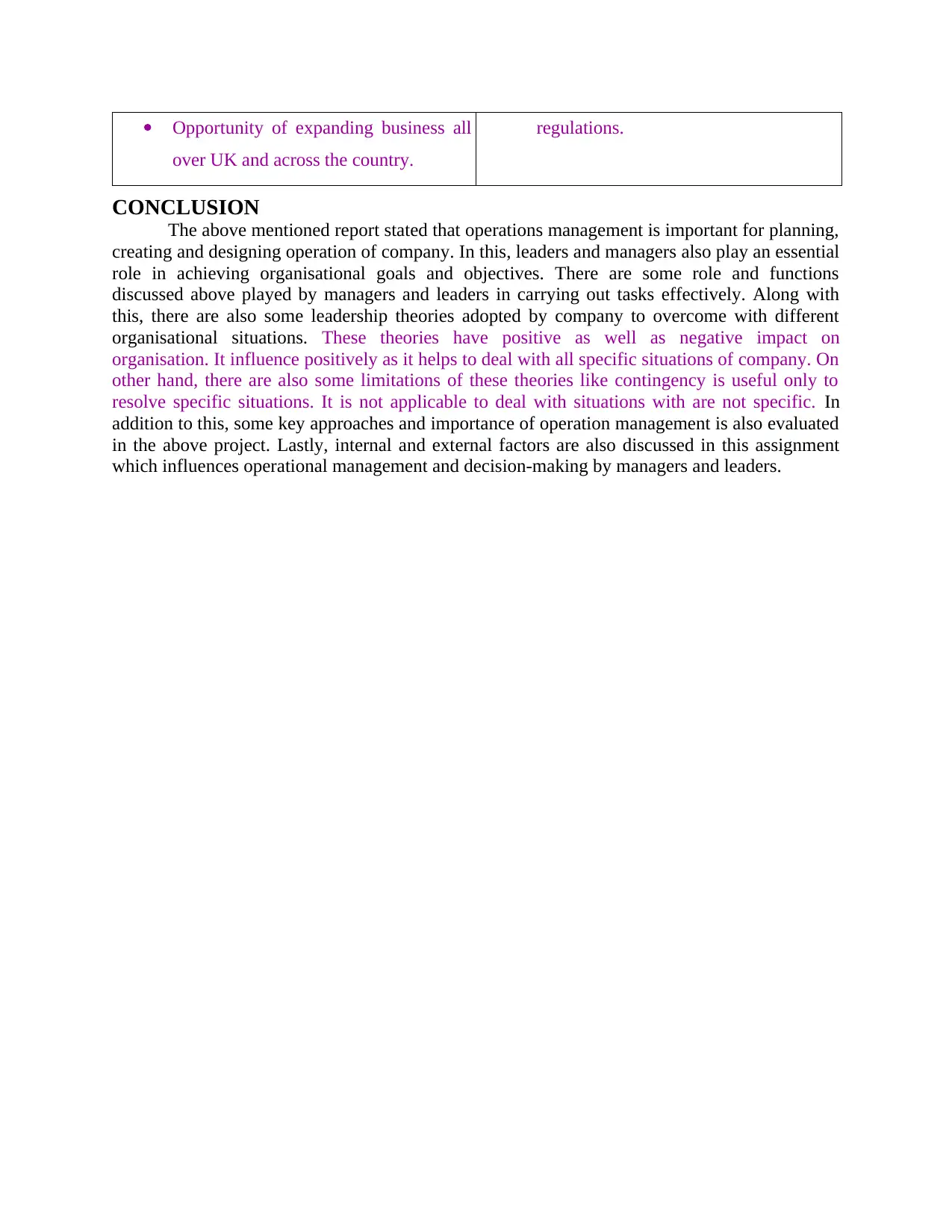
Opportunity of expanding business all
over UK and across the country.
regulations.
CONCLUSION
The above mentioned report stated that operations management is important for planning,
creating and designing operation of company. In this, leaders and managers also play an essential
role in achieving organisational goals and objectives. There are some role and functions
discussed above played by managers and leaders in carrying out tasks effectively. Along with
this, there are also some leadership theories adopted by company to overcome with different
organisational situations. These theories have positive as well as negative impact on
organisation. It influence positively as it helps to deal with all specific situations of company. On
other hand, there are also some limitations of these theories like contingency is useful only to
resolve specific situations. It is not applicable to deal with situations with are not specific. In
addition to this, some key approaches and importance of operation management is also evaluated
in the above project. Lastly, internal and external factors are also discussed in this assignment
which influences operational management and decision-making by managers and leaders.
over UK and across the country.
regulations.
CONCLUSION
The above mentioned report stated that operations management is important for planning,
creating and designing operation of company. In this, leaders and managers also play an essential
role in achieving organisational goals and objectives. There are some role and functions
discussed above played by managers and leaders in carrying out tasks effectively. Along with
this, there are also some leadership theories adopted by company to overcome with different
organisational situations. These theories have positive as well as negative impact on
organisation. It influence positively as it helps to deal with all specific situations of company. On
other hand, there are also some limitations of these theories like contingency is useful only to
resolve specific situations. It is not applicable to deal with situations with are not specific. In
addition to this, some key approaches and importance of operation management is also evaluated
in the above project. Lastly, internal and external factors are also discussed in this assignment
which influences operational management and decision-making by managers and leaders.
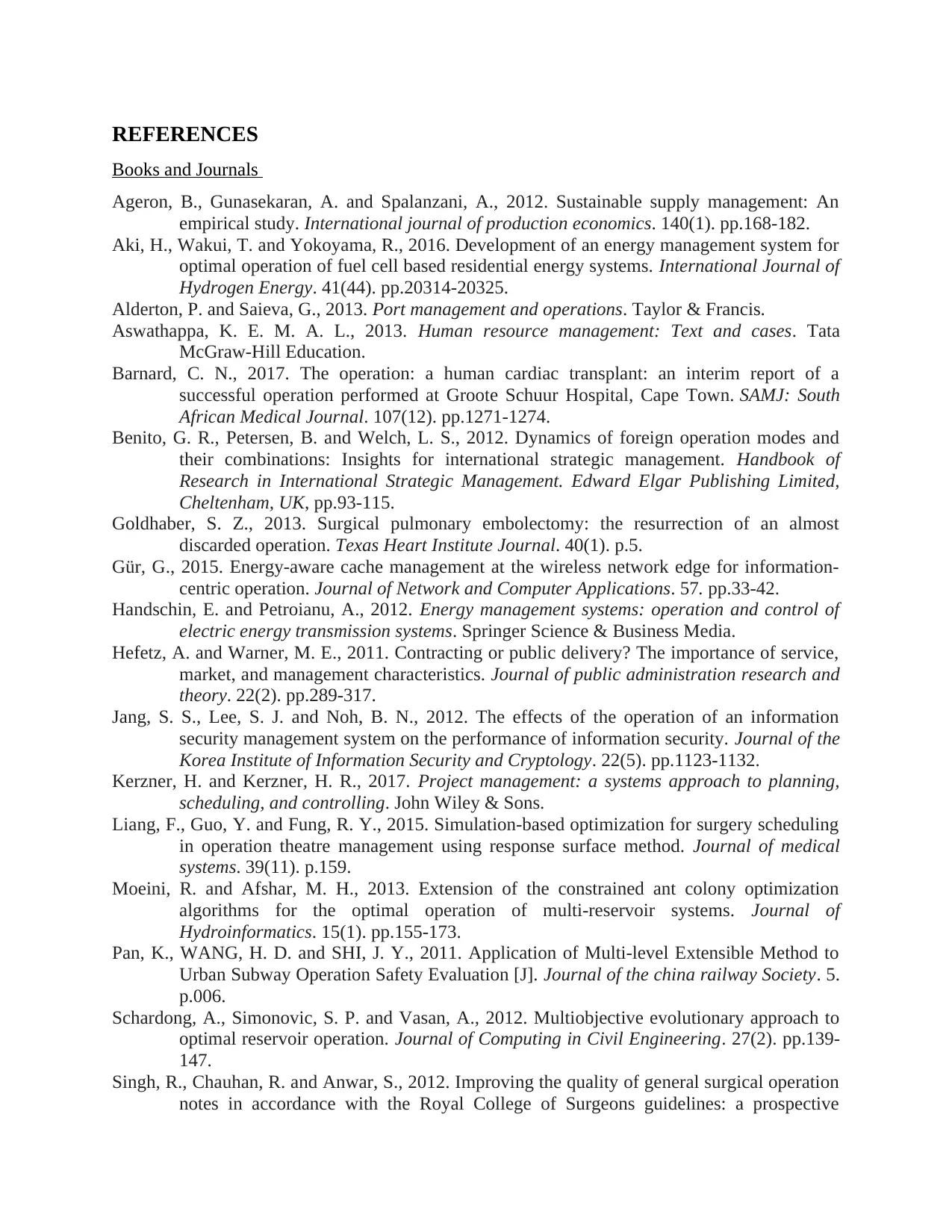
REFERENCES
Books and Journals
Ageron, B., Gunasekaran, A. and Spalanzani, A., 2012. Sustainable supply management: An
empirical study. International journal of production economics. 140(1). pp.168-182.
Aki, H., Wakui, T. and Yokoyama, R., 2016. Development of an energy management system for
optimal operation of fuel cell based residential energy systems. International Journal of
Hydrogen Energy. 41(44). pp.20314-20325.
Alderton, P. and Saieva, G., 2013. Port management and operations. Taylor & Francis.
Aswathappa, K. E. M. A. L., 2013. Human resource management: Text and cases. Tata
McGraw-Hill Education.
Barnard, C. N., 2017. The operation: a human cardiac transplant: an interim report of a
successful operation performed at Groote Schuur Hospital, Cape Town. SAMJ: South
African Medical Journal. 107(12). pp.1271-1274.
Benito, G. R., Petersen, B. and Welch, L. S., 2012. Dynamics of foreign operation modes and
their combinations: Insights for international strategic management. Handbook of
Research in International Strategic Management. Edward Elgar Publishing Limited,
Cheltenham, UK, pp.93-115.
Goldhaber, S. Z., 2013. Surgical pulmonary embolectomy: the resurrection of an almost
discarded operation. Texas Heart Institute Journal. 40(1). p.5.
Gür, G., 2015. Energy-aware cache management at the wireless network edge for information-
centric operation. Journal of Network and Computer Applications. 57. pp.33-42.
Handschin, E. and Petroianu, A., 2012. Energy management systems: operation and control of
electric energy transmission systems. Springer Science & Business Media.
Hefetz, A. and Warner, M. E., 2011. Contracting or public delivery? The importance of service,
market, and management characteristics. Journal of public administration research and
theory. 22(2). pp.289-317.
Jang, S. S., Lee, S. J. and Noh, B. N., 2012. The effects of the operation of an information
security management system on the performance of information security. Journal of the
Korea Institute of Information Security and Cryptology. 22(5). pp.1123-1132.
Kerzner, H. and Kerzner, H. R., 2017. Project management: a systems approach to planning,
scheduling, and controlling. John Wiley & Sons.
Liang, F., Guo, Y. and Fung, R. Y., 2015. Simulation-based optimization for surgery scheduling
in operation theatre management using response surface method. Journal of medical
systems. 39(11). p.159.
Moeini, R. and Afshar, M. H., 2013. Extension of the constrained ant colony optimization
algorithms for the optimal operation of multi-reservoir systems. Journal of
Hydroinformatics. 15(1). pp.155-173.
Pan, K., WANG, H. D. and SHI, J. Y., 2011. Application of Multi-level Extensible Method to
Urban Subway Operation Safety Evaluation [J]. Journal of the china railway Society. 5.
p.006.
Schardong, A., Simonovic, S. P. and Vasan, A., 2012. Multiobjective evolutionary approach to
optimal reservoir operation. Journal of Computing in Civil Engineering. 27(2). pp.139-
147.
Singh, R., Chauhan, R. and Anwar, S., 2012. Improving the quality of general surgical operation
notes in accordance with the Royal College of Surgeons guidelines: a prospective
Books and Journals
Ageron, B., Gunasekaran, A. and Spalanzani, A., 2012. Sustainable supply management: An
empirical study. International journal of production economics. 140(1). pp.168-182.
Aki, H., Wakui, T. and Yokoyama, R., 2016. Development of an energy management system for
optimal operation of fuel cell based residential energy systems. International Journal of
Hydrogen Energy. 41(44). pp.20314-20325.
Alderton, P. and Saieva, G., 2013. Port management and operations. Taylor & Francis.
Aswathappa, K. E. M. A. L., 2013. Human resource management: Text and cases. Tata
McGraw-Hill Education.
Barnard, C. N., 2017. The operation: a human cardiac transplant: an interim report of a
successful operation performed at Groote Schuur Hospital, Cape Town. SAMJ: South
African Medical Journal. 107(12). pp.1271-1274.
Benito, G. R., Petersen, B. and Welch, L. S., 2012. Dynamics of foreign operation modes and
their combinations: Insights for international strategic management. Handbook of
Research in International Strategic Management. Edward Elgar Publishing Limited,
Cheltenham, UK, pp.93-115.
Goldhaber, S. Z., 2013. Surgical pulmonary embolectomy: the resurrection of an almost
discarded operation. Texas Heart Institute Journal. 40(1). p.5.
Gür, G., 2015. Energy-aware cache management at the wireless network edge for information-
centric operation. Journal of Network and Computer Applications. 57. pp.33-42.
Handschin, E. and Petroianu, A., 2012. Energy management systems: operation and control of
electric energy transmission systems. Springer Science & Business Media.
Hefetz, A. and Warner, M. E., 2011. Contracting or public delivery? The importance of service,
market, and management characteristics. Journal of public administration research and
theory. 22(2). pp.289-317.
Jang, S. S., Lee, S. J. and Noh, B. N., 2012. The effects of the operation of an information
security management system on the performance of information security. Journal of the
Korea Institute of Information Security and Cryptology. 22(5). pp.1123-1132.
Kerzner, H. and Kerzner, H. R., 2017. Project management: a systems approach to planning,
scheduling, and controlling. John Wiley & Sons.
Liang, F., Guo, Y. and Fung, R. Y., 2015. Simulation-based optimization for surgery scheduling
in operation theatre management using response surface method. Journal of medical
systems. 39(11). p.159.
Moeini, R. and Afshar, M. H., 2013. Extension of the constrained ant colony optimization
algorithms for the optimal operation of multi-reservoir systems. Journal of
Hydroinformatics. 15(1). pp.155-173.
Pan, K., WANG, H. D. and SHI, J. Y., 2011. Application of Multi-level Extensible Method to
Urban Subway Operation Safety Evaluation [J]. Journal of the china railway Society. 5.
p.006.
Schardong, A., Simonovic, S. P. and Vasan, A., 2012. Multiobjective evolutionary approach to
optimal reservoir operation. Journal of Computing in Civil Engineering. 27(2). pp.139-
147.
Singh, R., Chauhan, R. and Anwar, S., 2012. Improving the quality of general surgical operation
notes in accordance with the Royal College of Surgeons guidelines: a prospective
⊘ This is a preview!⊘
Do you want full access?
Subscribe today to unlock all pages.

Trusted by 1+ million students worldwide
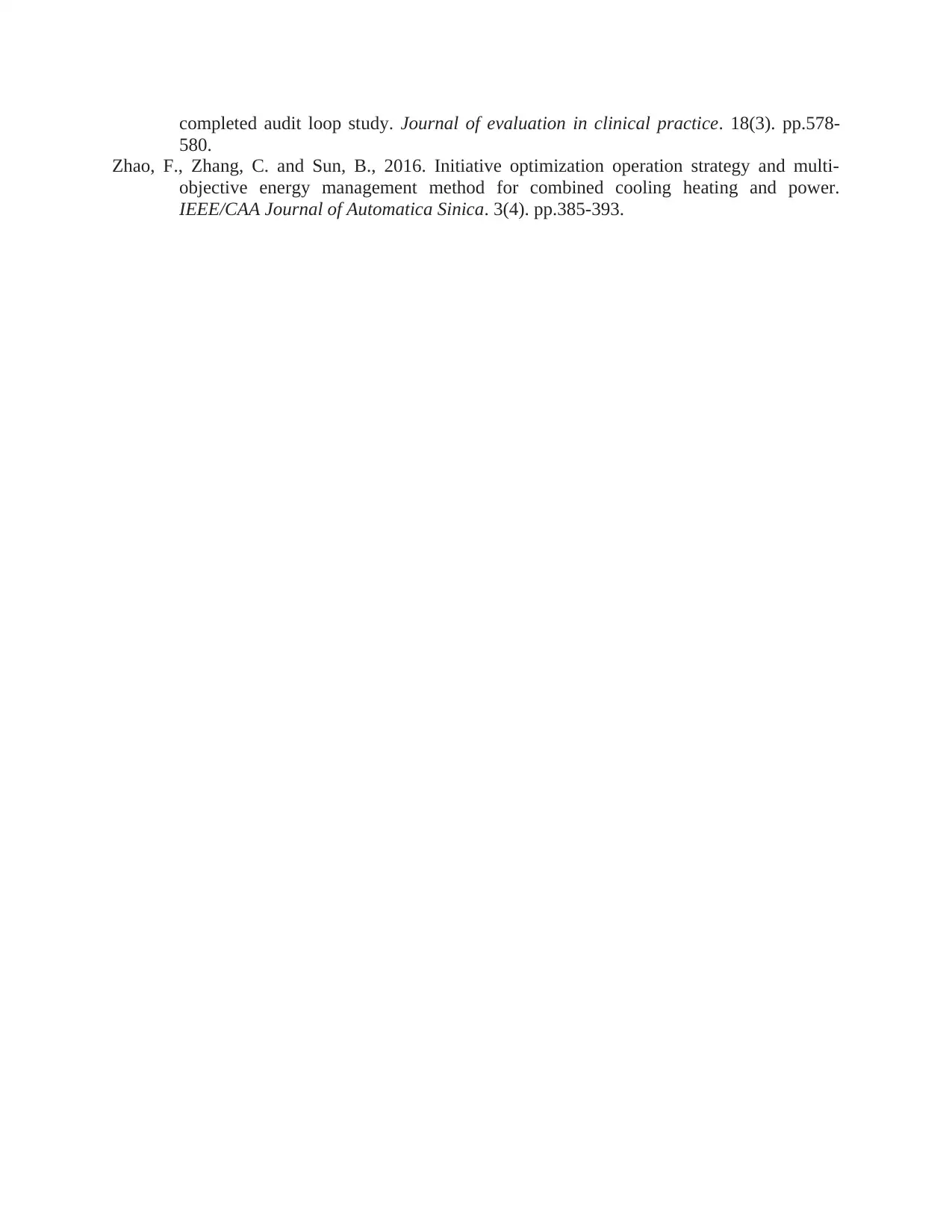
completed audit loop study. Journal of evaluation in clinical practice. 18(3). pp.578-
580.
Zhao, F., Zhang, C. and Sun, B., 2016. Initiative optimization operation strategy and multi-
objective energy management method for combined cooling heating and power.
IEEE/CAA Journal of Automatica Sinica. 3(4). pp.385-393.
580.
Zhao, F., Zhang, C. and Sun, B., 2016. Initiative optimization operation strategy and multi-
objective energy management method for combined cooling heating and power.
IEEE/CAA Journal of Automatica Sinica. 3(4). pp.385-393.
1 out of 10
Related Documents
Your All-in-One AI-Powered Toolkit for Academic Success.
+13062052269
info@desklib.com
Available 24*7 on WhatsApp / Email
![[object Object]](/_next/static/media/star-bottom.7253800d.svg)
Unlock your academic potential
Copyright © 2020–2026 A2Z Services. All Rights Reserved. Developed and managed by ZUCOL.




